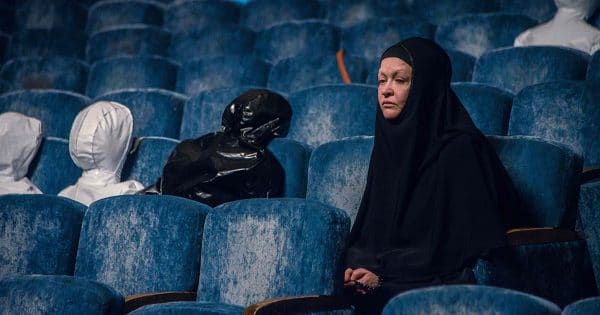
Dir.: Ivan I. Tverdovskiy; Cast: Natalya Pavlenkova, Olga Lupshina, Kseniya Zueva, Alexandar Semchev; Russia/Estonia/UK/Italy 2020, 135 min.
On October 23rd 2002 850 spectators were held hostage in the Dubrovka theatre of Moscow during the performance of the musical “North-East”. 170 people lost their lived when troops stormed the auditorium. The perpetrators were aggrieved Chechnyans.
Russian writer/director Ivan I. Tverdovskiy (Zoology) reconstructs the events and explores the personal recriminations of the survivors in this impressive, but doom laden feature.
Centred around Natasha (Pavlenkova), a survivor turned nun, who returns to Moscow for the seventeenth anniversary meeting of victims’ families. We learn that she is estranged from her family: her daughter Galya (Zueva), who looks after paralysed husband Oleg (Semchev), cannot understand why her mother returns every year to open old wounds: Natasha’s thirteen-year-old son Yegor was killed in the massacre. Supported in her efforts of reconciliation and remembrance by Sveta (Lupshina) – who lost husband and daughter that night – Natasha tries to convince Galya to come to the memorial in the theatre. But her daughter leaves her with Oleg, storming angrily out of the flat, even though she would later appear at the theatre.
The ‘reconstructing’ is painful to watch: everyone has to chose an inflatable mannequin to sit next to them: white for the victims, black for the attackers and blue for the survivors who could not come on the day. They talk about the surprise attack, and how it was initially thought that the attackers, who shot at the ceiling on stage, were part of the show. Only when the first victim was shot, did the gravity of the situation set in. Aslan, the terrorists‘ spokesman, asked the audience to phone their friends and families. Later the mobiles were collected and stored outside the auditorium where a young attacker played video games and talked to the friends and relatives. Many of the hostage-takers seemed to be very young: one of the Shahidwomen even prayed with the hostages. The survivors also re-enact the arrival of the buffet-trolley, the hostage takers shared snacks and water with their victims. But they also shouted at the audience, that “you got to the theatre here, whilst we have to live with war”. After a few hours, the caretaker of the theatre wants the memorial audience to leave, but Natasha talks him out of it. The witnesses talk about resistance on the night: one man hitting a Shahid woman, and another hostage-taker shooting at him but missing, killing a young woman sitting near the aisle, who is hit in the stomach. The caretaker appears again, this time he is adamant about the closure, and switches the light in the auditorium off.
By now, Galya has joined, and she listens to her mother’s accounts of the escape on the fateful night. The hostages had to queue to go to the toilet. When Natasha’s turn came, she was with a woman who opened the window and jumped out, telling the hysterical Natasha to jump too, and stop shouting. After Natasha jumped, she knew she had made a mistake, but her legs were injured and she could not go back.
After police has ended the memorial well after midnight, the theatre manager takes back the charges, and Natasha makes a final attempt to reconcile with her daughter, only to find Oleg being loaded into an ambulance, with Galya asking for her help.
DoP Fedor Glazachev changes from panorama shots of the auditorium to intensive close-ups, showing the incredulity of the situation. Pavlenkova is brilliant, so is the ensemble acting. But Tverdovskiy goes right to the bone in this no holds barred account, and while one agrees which his approach intellectually, the end of this tour-de-force of grief, denial and guilt cannot come too soon. AS
VENICE FILM FESTIVAL | Horizons 2030
AS